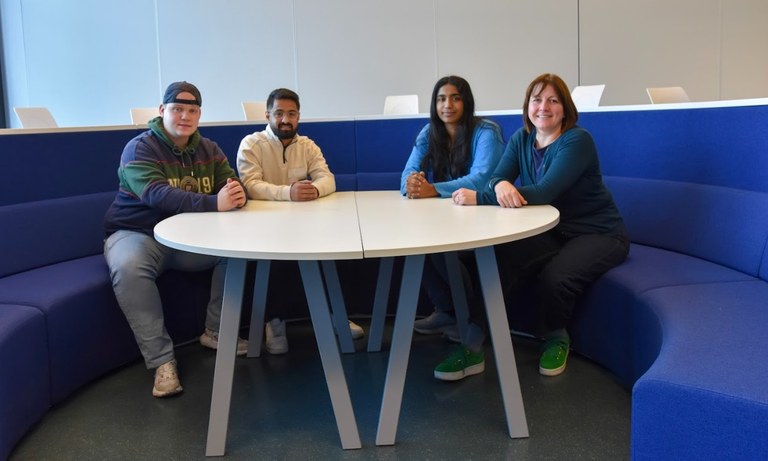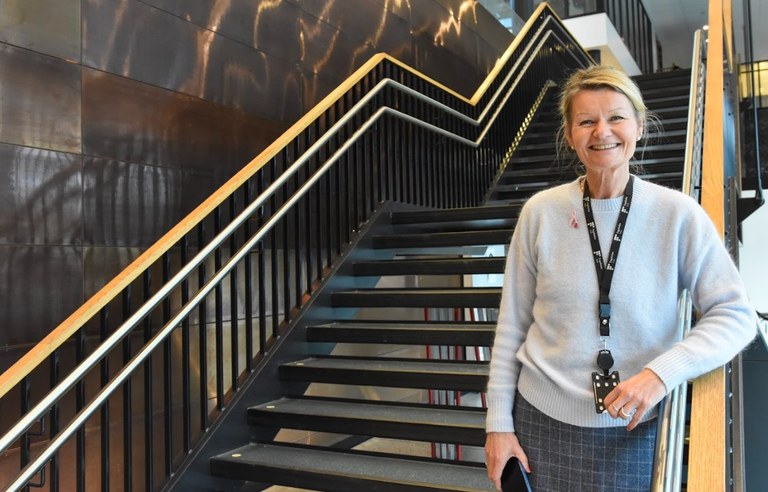Norway faces tough competition for green expertise
Norway lacks the necessary competencies for a successful green transition. The Vocational School in Oslo is trying to do something about it.
“We notice that we are attractive in the labour market,” say the students we meet at campus “Kuben” in Oslo.
Companies are queueing up to showcase their wares for students at the Vocational School in Oslo, and to offer them jobs.
Need to be better prepared
In June, the Norwegian Committee on Skill Needs launched their report “Future skill needs – challenges for a green transition of the labour market”. The committee concluded that Norway lacks the necessary skills to succeed with the green transition.
“The green transition demands more specialised skills, but parts of the population are not sufficiently prepared. There is, for instance, a lack of basic skills. Attitudes to climate change might also hinder change,” said Sveinung Skule, head of the Committee on Skill Needs, as the report was presented.
Skule also pointed out that many of the skills that Norway needs must be created among those who are already in the labour market, which will necessitate a lot of further education and learning in the workplace.
Opening many new doors
Roheel Yaqub (27) and Aleksander Trøftmoen (23) are already trained electricians and electric power engineers, while Kawsica Rashasingham (20) is both a concrete worker and carpenter. They all attend various courses within BIM – Building Information Modelling.

Aleksander Trøftmoen (23), Roheel Yaqub (27) and Kawsica Rashasingham (20) together with their teacher Kristine Tveit at the Vocational School in Oslo.
The study gives them skills in 3D modelling, digital leadership for construction and technical installations and infrastructure – skills that are sought-after in the trades they already have been working in.
“We see how this opens several doors into the labour market,” say Yaqub and Trøftmoen.
The important digital skills
The idea behind the vocational schools in Norway is for them to offer skills that companies need. And businesses are currently very much asking for two types in particular: digital and sustainability skills.
The vocational schools offer short, practical courses building on apprenticeship certificates, or at least five years of practical experience. Students can attend full or part-time, in the daytime or evenings.
Courses at the Vocational School in Oslo aim to turn students into specialists in digital cooperation and digital learning. There is also a focus on subjects like the circular economy and the development of students’ skills in innovation and entrepreneurship. The courses are as practically oriented as possible.
Innovation camp
The idea is to make the skilled workers more confident in thinking innovatively. The students the Nordic Labour Journal spoke to had all been thrown into a two-day innovation camp early on in their course. This is a programme focusing on creativity, the joy of creation and innovation. Businesses present a challenge which the students must solve within a set time. They have to look at things with fresh eyes and find new solutions.
“We learn how to ask questions about why things are the way they are. It is very educational and exciting,” says Rashasingham.
Green trade courses
Anne K. Eggen Lervik is the head of innovation and communication at the Vocational School in Oslo. She is in no doubt that the industrial digital and green transition has to start with the skilled workers.

Digitalisation, digitalisation, digitalisation, says Anne K. Eggen Lervik when asked what the labour market demands in terms of skills. Eggen Lervik is head of strategic innovation and communication at the Vocational School in Oslo.
But to succeed they need skills, not least digital ones. That is why the school, in cooperation with the trade, has developed the course “The digital skilled worker for the construction and civil engineering trade”.
The course “Future buildings – circular economy, technology and entrepreneurship” was created from that same need, also in cooperation with trade representatives from the innovation cluster Construction City. This course offers improved specialisation in sustainability, digitalisation, circular economy and entrepreneurship.
“We must dare to think in new ways. This is crucial if we want to succeed with the green transition across many trades. That is why innovation plays an important part in several of the Vocational School’s courses,” says Eggen Lervik.
She wants workplace learning to be valued.
“Many of our students combine work and studies,” she says.
Competition for the same skills
This summer, the Committee on Skill Needs published their conclusions based, among other things, on a report they had commissioned from researchers at the Nordic Institute for Studies of Innovation, Research and Education (NIFU). NIFU researcher Håkon Endresen Normann led the work on the report “Skills for a green transition”.
 Researchers have been looking at what skills are particularly important for a green transition across the whole of the labour market. They also studied the oil and gas sector very closely as well as new green businesses, and also municipal administration.
Researchers have been looking at what skills are particularly important for a green transition across the whole of the labour market. They also studied the oil and gas sector very closely as well as new green businesses, and also municipal administration.
What they found was that everybody, regardless of trade, is asking for the same skills. The municipalities’ needs for skills linked to the green transition, for instance, overlap to a large extent with the skills needed in the rest of the labour market.
Two-thirds lack expertise
NIFU uncovered a significant need for technical expertise, especially in ICT and electrical engineering. The greatest demand is for engineers, electricians and electronic technicians, ICT technicians/ICT consultants, and scientists and technical engineers.
There is also a major unmet need for skills in climate reporting, accounting and circular economy.
Nearly two-thirds of companies say they already have an unmet need for expertise, regardless of potential needs linked to the green transition. Nearly as many expect the green transition will require other skills and also lead to changes to existing tasks.
“There is already competition for these people. A green transition will amplify the competition for this expertise,” says Endresen Normann.
Workers need retraining
Workers’ skills improvement is considered to be the most important activity to meet future competence needs. Three out of four businesses say this is very important. More than half say recruitment is important.
“This might point to possible challenges linked to the fact that many businesses must compete with each other in the recruitment of much of the same expertise,” according to the report.
Courses and in-house training are by far the most relevant form of skills enhancement. Only a few companies consider higher education in combination with work as relevant.
“It is in many ways surprising that so many companies think that a major change like a green transition is best solved by relatively “low-key” internal skills enhancement, while more comprehensive formal skills enhancement is considered less relevant,” the researchers write in the report.
Political choices
Endresen Normann points out that political choices play a big role when it comes to which skills businesses will need in the future. He provides an example:
Say that politicians decide to halve emissions from the production of meat and dairy products. This would put a great deal of pressure on farmers to find new ways of running their farms.
Endresen Normann believes dramatic, albeit controversial, policies like that are needed to speed up the green transition across all trades, not only in oil and gas. But he fears that change will carry on in today’s tempo, which he believes is too slow to meet the necessary climate goals.
Someone will be hit, but who?
The NIFU researcher will be taking a closer look at the relationship between the green transition and the labour market. Endresen Normann and colleagues will look at the consequences of a green transition for different social groups, with a focus on skills and the labour market, in the project “Green and Just Labour Market”.
“A green transition and changing competence needs could lead to less demand for certain occupations and skills in parts of the labour market. Some will probably be hit, but we don’t yet know enough about which groups this will be. During the latest oil crisis, we saw that people with the lowest education levels were the ones who were most likely to lose their jobs,” says Endresen Normann.
- Bright future
-
Kawsica Rashasingham (20), Roheel Yaqub (27) and Aleksander Trøftmoen (23) are already sought-after in the labour market. Their year at the Vocational School in Oslo, with teachers like Kristine Tveit, is providing them with important and relevant skills.
- FACTS
-
The Norwegian Committee on Skill Needs has since 2017 produced and put into system knowledge of Norway’s future need for expertise.
The committee published its report on the need for skills for the green transition on 12 June (in Norwegian).
In 2022, it published the thematic report “Future Competence Needs – Higher Vocational Education for a Changing Labour Market”.
NIFU’s report “Skills for a green transition” (in Norwegian) by Håkon Endresen Normann, Markus Steen, Tuukka Mäkitie, Antje Klitkou, Pål Børing, Espen Solberg, Henrik Brynthe Lund, Mari Wardeberg and Lone Wanderås Fossum.
 Follow us on Facebook
Follow us on Facebook
